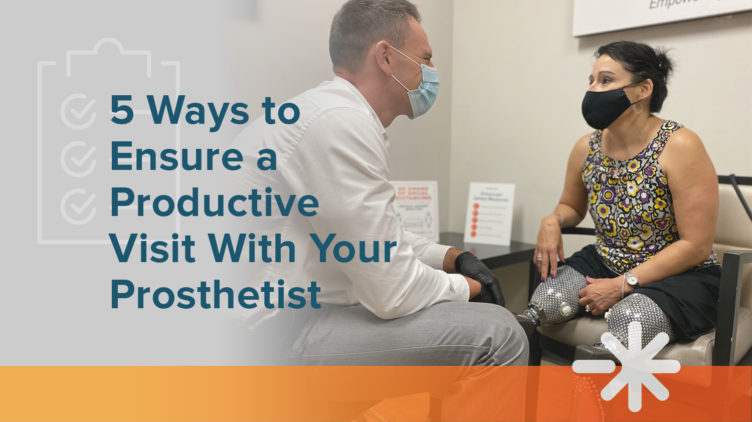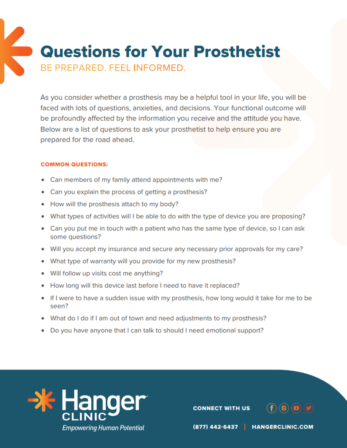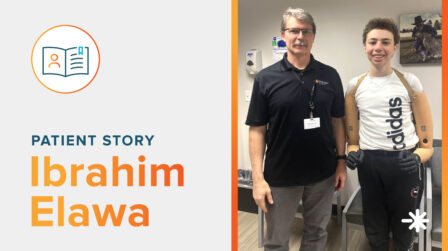5 Ways to Ensure a Productive Visit With Your Prosthetist

Getting a prosthesis is a life-changing event. Along the way, you’re bound to have many questions and concerns as you make decisions about your path forward. Fortunately, your Hanger Clinic prosthetist is there to help, and there are simple techniques you can use to help ensure you better understand the information and options provided to you throughout your care journey.
As the year comes to a close, it’s a great time to take a step back and think about your goals for what will hopefully be a much more promising year ahead. If you have limb loss or limb difference, your goals may center on achieving new milestones with your prosthesis, such as standing up, climbing a flight of stairs, or starting a new hobby or sport. Whatever your goals may be, the key to achieving them is to get actively involved in your prosthetic care by coming to your appointments prepared to ask the right questions. In fact, studies show that when people are actively involved during healthcare visits, they are more likely to be satisfied, follow recommendations, and get better results.1,2
Here are some tips and tricks to consider before your appointment to help ensure a successful visit.
TIP 1: Set Yourself Up for Success
Before you arrive for your appointment at Hanger Clinic, there are some steps you can take to start off on a positive note. First, when you call to schedule your appointment, make sure to ask if Hanger Clinic accepts your insurance plan and if they coordinate prior approvals on your behalf. The office may ask you to call your insurance company directly to learn more about your coverage.
Next, ask if there is anything you need to bring with you to the appointment, such as your ID, insurance card, medical records, prescription, or a pen and paper to take notes. Depending on what type of prosthesis you have or are considering, you may also want to ask if you need to wear anything specific to your appointment for your ease and comfort.
TIP 2: Communicate Your Goals
Prostheses can enhance quality of life by enabling users to do the things they love. It’s important to communicate with your prosthetist, so you can ensure you are getting the best possible prosthesis to meet your goals.
While at your appointments, talk to your prosthetist about any limitations you’re currently experiencing and about the activities you hope to accomplish after you get your new prosthesis—whether it’s everyday chores like folding laundry or returning to a beloved sport or hobby. With this information, together you can explore different options for devices that meet your needs and choose the best one.
TIP 3: Learn What to Expect
Whether this is your first time getting a prosthesis or you have already worn a few different devices, your Hanger Clinic prosthetist is there to walk you through every step of the way. Ask how the process will go so you know what to expect, from your initial consultation to your final fitting.
It’s important to understand how your prosthesis will attach to your body and how you will use it, too. Ask your prosthetist to explain these details to you, and don’t be afraid to take notes and ask follow-up questions. Many patients bring a friend or family member to these appointments to help them take in all of the new information. Your prosthetist may also provide you with materials to read or videos to watch so you can learn more at home.
Ask if there are signs you should watch for that indicate a potential problem with your device, such as pain, skin problems, unexpected noises, or a change in how the device fits or functions.
You can also ask your prosthetist if you can talk to others who have been living with the device you’re considering so you can get a real-world look at what life will be like after you get your prosthesis.
Questions to Ask Your Prosthetist
Download this list of questions to ask your prosthetist to help ensure you are prepared for the road ahead.

TIP 4: Learn About Maintenance
Getting a prosthesis is not a one-and-done event. Be sure to ask your prosthetist how to take care of your device on a daily basis and when to schedule follow-ups or adjustments. This is also a good time to find out what kind of warranty your device has and whether there will be a cost associated with follow-up visits.
Also, ask about how to handle sudden issues with your prosthesis and how long it will take you to get an appointment with your prosthetist in the event of an urgent problem. If you travel frequently, ask what options are available for support if you run into challenges with your device while you’re on the road. Hanger Clinic has over 900 locations nationwide, so if you’re traveling domestically, there may be a clinic you can visit that is near your destination.
Finally, ask how long your device will last and when you can expect to need a new one. This will help you plan ahead and manage your care.
TIP 5: Remember Your Emotional Health
Getting a prosthesis is a significant life event, and you may be feeling mixed emotions about it. If you would like some emotional support during your journey, be sure to ask your prosthetist for a list of available resources, such as virtual support groups.
When you take the time and effort to prepare for your Hanger Clinic visit, you’ll make the most of your time with your prosthetist and help ensure you have a smooth transition with your new prosthesis so you can get back to doing what you love—even sooner.
1. Ha, Jennifer Fong, and Nancy Longnecker. “Doctor-patient communication: a review.” The Ochsner journal vol. 10,1 (2010): 38-43.
2. Kaplan S. H., Greenfield S., Ware J. E., Jr Assessing the effects of physician-patient interactions on the outcomes of chronic disease. Med Care. 1989;27((3 Suppl)):S110–S127.
Latest Updates
Subscribe to stay up-to-date on our latest posts.


